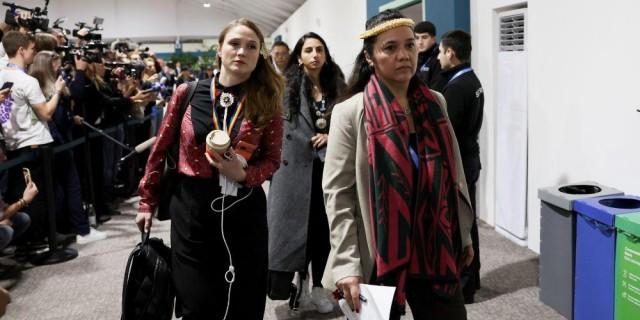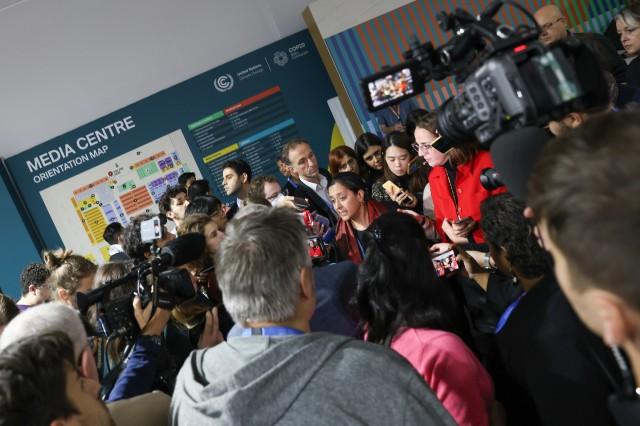The drama, one-liners and PH civil society’s take on the $300-B deal at COP29
_2024_11_26_01_08_28.jpg)
COP29 ran into overtime, officially finishing at 5:31 a.m. on Sunday morning, with a less than desirable result.
Scheduled to conclude on Friday evening, what was known as the Finance COP delivered not only a new finance goal of $300 billion by 2035 but incredible drama that kept exhausted delegates, observers, and attendees up and running all the way to its Sunday morning end — at least those who did not have flights to catch.
The Philippine delegation had already left their seats by the time the New Collective Quantized Goal was adopted around 2:30 a.m. on Sunday morning, presumably joining several other COP29 attendees in the rush to make it to the airport.
The Last-Minute Overtime Drama
The closing plenary saw several reschedules —thanks to the highly contested NCQG, the new climate finance goal that’s been the centerpiece of the two-week climate negotiations.
COP29 was already running on overtime, when the Alliance of Small Island States (AOSIS) and the Least Developed Countries (LDCs) suddenly walked out of the finance negotiations on Saturday evening, pushing back the scheduled 7 p.m. closing plenary even later.
“We have presently removed ourselves from the stalled MCQG discussions, which were not offering a progressive way forward,” AOSIS said in a statement, adding their “key asks on mitigation have been ignored.”
“We need to be shown the regard which our dire circumstances necessitate.”

At a little past 8 p.m. on Saturday, the first part of the closing plenary finally began, with the COP29 presidency quickly gaveling through the easier items of the agenda. As that happened, word had it negotiators were back in the room looking to agree on the money.
At 1 a.m. Sunday, the second and last part of the closing plenary finally pushed through, during which the $300-B deal was adopted.
It was met with applause, and not a few delegates shared a hug, but the triumphant cheers at the plenary hall of the Baku Olympic Stadium were quickly doused when India's Chandni Raina revealed that their request to speak before the adoption of the deal was ignored.
"We have informed the secretariat that we wanted to make a statement prior to any decision on the adoption. However, and this is for everyone to see, this has been stage-matched. We are extremely, extremely disappointed with this incident," Raina said.
Calling the incident "indicative of a lack of trust and a lack of collaboration," Raina said "gaveling and trying to ignore parties from speaking does not behoove the UNFCCC system and we would want you to hear us and hear our objection. We absolutely object to this unfair means followed for adoption."
_2024_11_26_00_57_51.jpg)
Nigeria's Nkiruka Maduekwe echoed India's sentiments and described the deal as an "insult" to the UN framework convention on climate change.
"It's going to be a huge disservice to myself, my country and women — the rural women, the women in developing countries. And not just women but everybody if we walk back home with $300B and say that developed countries are taking the lead," she began.
"That developed countries are taking the lead with $300B til 2035 is a joke and it's not something we should take lightly," Maduekwe continued.
"We do not accept this," she said as she referred to countries' climate plans, or what is called the Nationally Determined Contribution (NDCs).
"The NCQG was supposed to enable us to have realistic finance goal. $300B is unrealistic. Let us tell ourselves the truth. This is 3 a.m. and we are going to clap our hands and say this is what we are going to do? I don't think so."
The controversial NCQG seeks to replace the current $100B climate finance that rich countries will give to poor countries to help them cut their emissions and adapt to the impacts of a changing climate.
Cutting emissions is a surefire way to stay at the 1.5C warming goal set in the Paris Agreement of 2015.
One-liners driving home the point
Developing countries, including the Philippines arrived in Baku two weeks ago clear with its 1.3-T ask.
But as COP29 headed into the hot phase of negotiations in the second week, figures that were way below the demand began to surface.
On Wednesday's press conference by the chairs of the African Group of Negotiators, the LDC, and the G77 + China Group (where Philippines belongs), Bolivia's Diego Pacheco delivered a punchy one-liner that soon turned into a meme and became an often-quoted line among COP29 attendees.
"Is it a joke?" Pacheco responded when asked about a possible $200-300B NCQG deal.
Met with applause and laughter, Pacheco's witty one-liner was quickly repeated by G77's Adonia Ayebare, before turning serious, repeating the 1.3T ask, and saying, "we need a headline."
"I used to be a member of the press, and the headline is very important. It's better than the content. We need a good headline that talks about the quantum in trillions," he added.
When a version of the text dropped on Thursday afternoon with a $250B figure, it quickly prompted reactions from the science community, the civil service organizations, activists, and from delegates themselves.

"We think this latest text is really bad," Lidy Nacpil told GMA News Online. "It’s more than insulting. Taking into account inflation, that’s even lower than 100B in 2009, 15 years ago."
Referencing the game show "Deal or No Deal," Nacpil joined the many others who preferred a no deal to a bad deal and said, "It’s no deal on this new text."
'A Profound Moral Failing'
Following the delay at COP29, things finally started to settle down on Monday, when Aksyon Klima was able to call for a post-COP press conference together with some representatives of Philippine civil society organizations. While others could only prepare messages, a few managed to attend to give their reactions of the outcome of COP29.
Bishop Gerry Alminaza of the diocese of San Carlos and vice chair of Caritas Philippines, said in his statement that "COP29 has failed to honor its commitment to climate finance, leaving the most vulnerable nations to bear the brunt of a crisis they did not create."
"This neglect is not merely policy oversight but a profound moral failing," he added.
A strong advocate of renewable energy, Alminaza fortified the presence of religion at the global climate event that also saw a representative of the Holy See.
Alminaza, who was among those who successfully opposed a 350-megawatt coal-fired power plant back in 2018, not only gave talks at the faith pavilion of COP29, but also joined experts and advocates of renewable energy in their side events.
In his statement, Alminaza said "failure to assure the delivery of ambitious climate finance denies what could’ve been a swift transition to renewable energy that would help build our climate resilience."
"Faith without action is empty. Promises without fulfillment are hollow. The time to end fossil fuel dependency is now. The time to deliver climate finance commitments is now. Anything less is a betrayal of our responsibility as stewards of life."
Loss and Damage
While the NCQG's $300B deal got most of the strong disappointing reactions, several others pointed out how Loss and Damage fell off the table.
"We have been pushing for the inclusion of Loss and Damage under the NCQG and the NCQG was only able to say, 'yes we recognize the increasing needs of loss and damage' but wasn’t very implicit in ensuring that the needs for loss and damage on top of adaptation and mitigation are also included," Helen Magata of the Tebtebba Foundation said.
It is especially unfortunate because at COP29, the Philippines finally signed the country host agreement that would operationalize the Fund for Responding to Loss and Damage (FRLD).
While former Climate Change Commissioner and Philippine negotiator Yeb Saño earlier said the delegation will need to fight and ensure FRLD will not fall off NCQG, representatives from various CSOs are ready to work despite it not being part of the NCQG.
"It's not included as part of the package of NCQG but I think we need to ensure that pledges that were mentioned both in Dubai and some were announced in Baku do not remain pledges," Atty. Angela Ibay of World Wide Fund said.
"The question of disbursement is something the board can look into and ensure the rules or the ways by which access to the fund working alongside the trustee should ensure those who need it will be able to access the fund as soon as they need it," she added.
Ibay continued, "But first we have to ensure those funds which come from pledges that were promised become real funding that is channeled through the FLRD."
When the FLRD board meets in Manila come December to "begin to accelerate the operations of the fund to achieve its funding," it will hold space and engage with civil society organizations, Magata shared.
"Andun kami. We will definitely be tracking and pushing for the positions that we collectively hold as non-state observers in the fund. As of Nov 24, ang report ng fund is 731.15M pledges from 26 contributors from developed countries, and at least 2 developing countries (South Korea and UAE)," she said.
A Valiant Fight
Despite what many call a "disappointing outcome" of COP29, Ibay made sure to hail the efforts of the Philippine delegation.
"I was assigned to help the Philippine delegation, especially on Just Transition," she shared at the virtual press conference on Monday. "In fairness to the Philippine delegation, they really worked very hard in trying to put forward what would be our priorities as a country."
"We owe it to our negotiators for putting up a valiant fight," Ibay said, adding she can testify to the delegation's "sleepless nights trying to ensure that we are being heard as a country, despite not being in any of the subgroups."
Speaking to GMA News Online before the gavel dropped on Sunday, DENR's Noralene M. Uy, Ph.D, Assistant Secretary for Policy, Planning, International Affairs and Climate Change said there is nothing to be worried about even if the 1.3-T demand was not met.
"On our own, gumagawa tayo ng paraan, even without finance flows from developed countries (On our way, we are making ways, even without finance flows from developed countries)."
"The Philippines has a more pro-active approach. Through bilateral ang process natin, from developed countries din naman yun and we are getting support. Through DENR pa lang, maraming lumalapit na. They really want to support (The Philippines has a more pro-active approach. Our process is bilateral, which also come from developed countries. We are getting support. With DENR alone, there are many interested parties who really want to support)," Uy said.
"We have unique funds also like People's Survival Fund na stregnthen na and medyo maayos na," Uy continued, adding there has been a replenishment of the fund for 2025. "May call na rin naman for next year, marami na naman tayong mabibigayn na LGUs and organizations to work on adaptation."
"May mechanisms tayo. Kaya 'wag tayo mas masyado magalala (We have the mechanisms so let's not be too worried)," Uy added.
— LRD/GMA Integrated News
This story was produced as part of the COP29 Climate Change Media Partnership, a journalism fellowship organized by Internews' Earth Journalism Network and the Stanley Center for Peace and Security.




